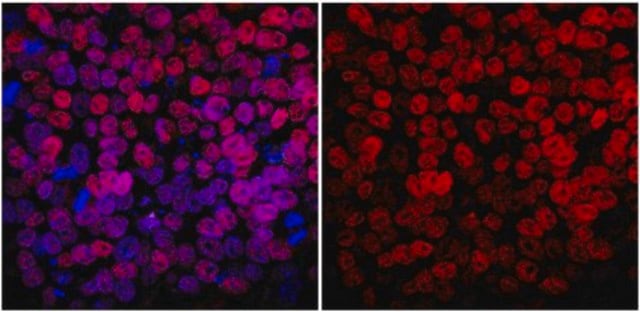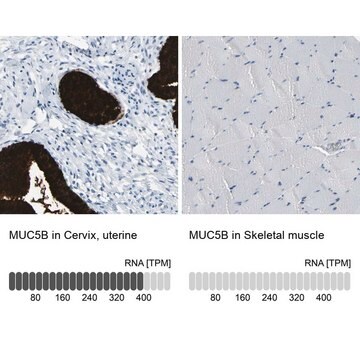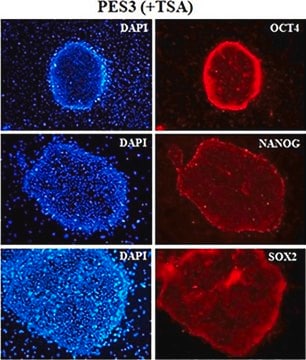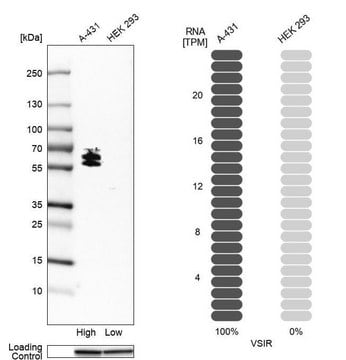FCMAB116P
Milli-Mark Anti-SSEA-4-PE Antibody, clone MC-813-70
clone MC-813-70, Milli-Mark®, from mouse
Sign Into View Organizational & Contract Pricing
All Photos(4)
About This Item
UNSPSC Code:
12352203
eCl@ss:
32160702
NACRES:
NA.41
Recommended Products
biological source
mouse
Quality Level
conjugate
PE
antibody form
purified antibody
antibody product type
primary antibodies
clone
MC-813-70, monoclonal
species reactivity
human
manufacturer/tradename
Milli-Mark®
technique(s)
flow cytometry: suitable
immunocytochemistry: suitable
isotype
IgG3κ
shipped in
wet ice
target post-translational modification
unmodified
Gene Information
human ... FUT4(2526)
Related Categories
General description
N-terminal GST-tagged, recombinant human MuRF1 full length, expressed in E.coli. Purified using glutathione sepharose.
The cell-surface markers used routinely to identify undifferentiated human embryonic stem cells (hESCs) were initially characterized as markers for mESCs, mouse embryonic carcinomas (ECs), or human EC cells. Stage-specific embryonic antigen-3 (SSEA-3) and SSEA-4 are widely used as cell-surface markers to define both human and mouse ESCs. SSEA-3 and SSEA-4 are expressed on undifferentiated hESCs but not on undifferentiated mESCs.
Specificity
This antibody reacts with the stage-specific embryonic antigen-4 (SSEA-4) that is expressed upon the surface of human tetracarcinoma stem cells (EC), human embryonic germ cells (EG) and human embryonic stem cells (ES).
No immunoreactivity is evident with undifferentiated murine EC, ES and EG cells. Expression of SSEA-4 is down regulated following differentiation of human EC cells. In ctontrast, the differentiation of murine EC and ES cells may be accompanied by an increase in SSEA-4 expression.
No immunoreactivity is evident with undifferentiated murine EC, ES and EG cells. Expression of SSEA-4 is down regulated following differentiation of human EC cells. In ctontrast, the differentiation of murine EC and ES cells may be accompanied by an increase in SSEA-4 expression.
Immunogen
Human embryonal carcinoma cell line 2102Ep.
Application
Immunocytochemical staining of live H9 human ES cells incubated for 30 minutes at 37oC with 1:50 dilution of anti-SSEA-4, clone MC-813-70, PE conjugate (Cat. No. FCMAB116P) monoclonal antibody.
Pluripotent human ES cells exhibit strong immunoreactivity to this antibody.
Immunocytochemical staining of fixed H9 human ES cells incubated for 2 hours at 2-8oC with 1:50 dilution of anti-SSEA-4, clone MC-813-70, PE conjugated (Cat. No. FCMAB116P) monoclonal antibody.
Pluripotent human ES cells exhibit strong immunoreactivity to this antibody.
Pluripotent human ES cells exhibit strong immunoreactivity to this antibody.
Immunocytochemical staining of fixed H9 human ES cells incubated for 2 hours at 2-8oC with 1:50 dilution of anti-SSEA-4, clone MC-813-70, PE conjugated (Cat. No. FCMAB116P) monoclonal antibody.
Pluripotent human ES cells exhibit strong immunoreactivity to this antibody.
Research Category
Stem Cell Research
Stem Cell Research
Research Sub Category
Pluripotent & Early Differentiation
Pluripotent & Early Differentiation
This Milli-Mark Anti-SSEA-4-PE Antibody, clone MC-813-70 is validated for use in FC, IC for the detection of SSEA-4.
Physical form
Protein A purified
Purified mouse monoclonal IgG3 conjugated to PE fluorochrome in PBS with less than 0.09% sodium azide and 15 mg/mL BSA.
Storage and Stability
Maintain refrigerated at 2-8oC protected from light in undiluted aliquots for up to 6 months from date of receipt.
Analysis Note
Control
Pluripotent human embryonic stem (ES) cells
Pluripotent human embryonic stem (ES) cells
Legal Information
MILLI-MARK is a registered trademark of Merck KGaA, Darmstadt, Germany
Disclaimer
Unless otherwise stated in our catalog or other company documentation accompanying the product(s), our products are intended for research use only and are not to be used for any other purpose, which includes but is not limited to, unauthorized commercial uses, in vitro diagnostic uses, ex vivo or in vivo therapeutic uses or any type of consumption or application to humans or animals.
Not finding the right product?
Try our Product Selector Tool.
Storage Class Code
10 - Combustible liquids
WGK
WGK 2
Flash Point(F)
Not applicable
Flash Point(C)
Not applicable
Certificates of Analysis (COA)
Search for Certificates of Analysis (COA) by entering the products Lot/Batch Number. Lot and Batch Numbers can be found on a product’s label following the words ‘Lot’ or ‘Batch’.
Already Own This Product?
Find documentation for the products that you have recently purchased in the Document Library.
Pooja Biswas et al.
Human mutation, 42(2), 189-199 (2020-12-01)
Inherited retinal degenerations (IRDs) are a group of genetically heterogeneous conditions with a broad phenotypic heterogeneity. Here, we report detection and validation of the underlying cause of progressive retinal degeneration in a nuclear family of European descent with a single
Vanessa Sauer et al.
Cell transplantation, 25(12), 2221-2243 (2016-08-12)
Although several types of somatic cells have been reprogrammed into induced pluripotent stem cells (iPSCs) and then differentiated to hepatocyte-like cells (iHeps), the method for generating such cells from renal tubular epithelial cells shed in human urine and transplanting them
Our team of scientists has experience in all areas of research including Life Science, Material Science, Chemical Synthesis, Chromatography, Analytical and many others.
Contact Technical Service








